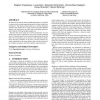Free Online Productivity Tools
i2Speak
i2Symbol
i2OCR
iTex2Img
iWeb2Print
iWeb2Shot
i2Type
iPdf2Split
iPdf2Merge
i2Bopomofo
i2Arabic
i2Style
i2Image
i2PDF
iLatex2Rtf
Sci2ools
CCS
2010
ACM
2010
ACM
Return-oriented programming without returns
We show that on both the x86 and ARM architectures it is possible to mount return-oriented programming attacks without using return instructions. Our attacks instead make use of certain instruction sequences that behave like a return, which occur with sufficient frequency in large libraries on (x86) Linux and (ARM) Android to allow creation of Turing-complete gadget sets. Because they do not make use of return instructions, our new attacks have negative implications for several recently proposed classes of defense against return-oriented programming: those that detect the too-frequent use of returns in the instruction stream; those that detect violations of the last-in, first-out invariant normally maintained for the return-address stack; and those that modify compilers to produce code that avoids the return instruction. Categories and Subject Descriptors D.4.6 [Operating Systems]: Security and Protection General Terms Security, Algorithms
CCS 2010 | Return Instruction | Return-oriented Programming | Return-oriented Programming Attacks | Security Privacy |
Related Content
| Added | 06 Dec 2010 |
| Updated | 06 Dec 2010 |
| Type | Conference |
| Year | 2010 |
| Where | CCS |
| Authors | Stephen Checkoway, Lucas Davi, Alexandra Dmitrienko, Ahmad-Reza Sadeghi, Hovav Shacham, Marcel Winandy |
Comments (0)

